Getting to know Kannur
Part 2: A local culinary legend and a toddy shop trail with guide Praveen Shenoy
Posted by ClaireThis day we devoted mainly to foodie pursuits, specifically toddy shops which Keralans keep a special place in their hearts for. First we had breakfast at a shop with no name near the wholesale market; a spotless bustling canteen offering puttu, a typical breakfast dish of rice flour mixed with coconut, steamed in cylindrical vessels.
There were four options to go with this puttu; cherupayar or mung bean curry, mutton curry, kadala or black chickpeas curry, and lastly banana and pappadom. I thought it best to try a little of each. They were all great combinations with the puttu; the mutton (goat) curry gravy was the colour of dark chocolate and had a sweetness alongside the spiciness, the chickpeas were cooked with clove and black pepper, the mung beans were lovely and homely with a chilli kick, but it was hard to beat the banana and pappadom combination which requires smashing the pappadom, and squeezing bits of banana together with the broken pappadom and the puttu. Something about the mashing of banana and the mixing of everything together briefly connected me to a very early memory.
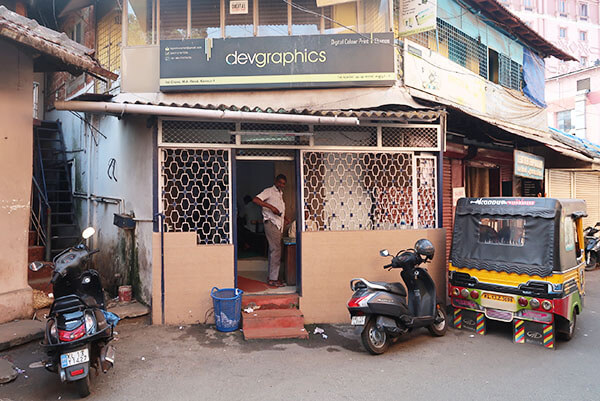
Later I found out that this shop is called Onakkan Bharathi (it has no need of a signboard, everybody knows where it is), and I met the owner Sumesh who kindly allowed me into his small busy kitchen and explained how they prepare their signature dish, the mutton curry. It is cooked twice daily, morning and afternoon, making a total of 1500 portions.
Sumesh’s grandfather opened this shop and his grandson follows the same menu and methods. They still use the traditional hollowed-out bamboo poles for steaming the puttu. The food is very tasty, homely and incredibly good value, and its reputation well deserved.
We must be thankful for people like Sumesh who could have decided to expand or franchise out their very successful businesses, but have instead chosen to put their energies into doing what they do to the best of their abilities, and carrying on the family culinary traditions, while all around more modern offerings are mushrooming, including fried chicken and kebab shops.
Praveen had been making enquiries. One of his friends was a bit of a toddy shop expert, and they had compared notes. A list had been drawn up, and there were five to visit over the course of the day. The first was difficult to find, somewhat off the beaten track in the midst of a semi rural neighbourhood. We stopped three or four times for directions.

Toddy shops are local premises licensed to sell toddy or kallu as it is known in Kerala, the fermented sap of a coconut palm tree. It is collected manually by toddy tappers, men who scale the tall palms and collect the sap from clay pots they have attached to the cut stem of the flower. Once collected, the alcohol content increases as the fermentation process continues throughout the day. By evening, it will be stronger and sourer in taste.
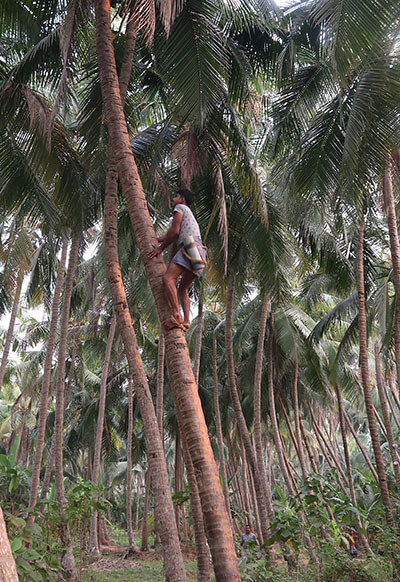
Chakkana is the particular term for food that is served up in toddy shops. It‘s usually served on small steel dishes, and is likely to be hotter and spicier with a judicious use of black pepper. It is overwhelmingly non vegetarian and served with cassava, and of course a glass or bottle of toddy.
People come for the different style of cooking, even if they don’t want to drink toddy.
Here are some of the dishes we came across: kozhi parts ie parts of chicken or innards, fried up in spices, squid roast, prawn fry, fish curry, different types of fried fish, mutton brain masala, pork fry, shark curry, clam stir fry, crab fry, black beans curry, fish head curry. Cassava, kaltappam and vellappam, types of fermented rice pancakes, provide the carbohydrates.
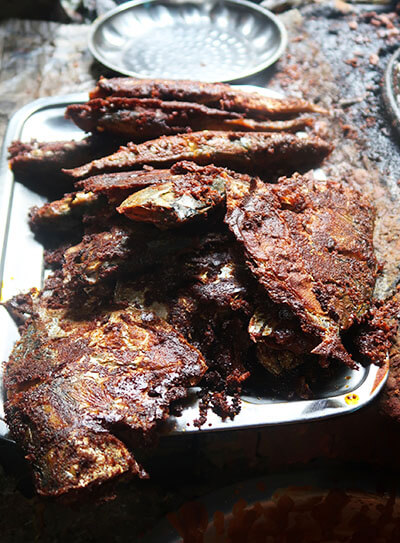
The toddy shops we visited were all different, although there were some dishes in common. One was in a traditional Kerala bungalow style building with a number of small rooms you could tuck yourself away in, another had a TV attached high up on the wall. Two were surrounded by lush greenery, two were on the main road, and one was in a coconut grove by a river with toddy tappers at work in the trees around. One had a husband and wife team in the kitchen, two had ladies in their kitchens (one a grandmother), and two had men in the kitchen. They all cooked on wood burning stoves.
Toddy shop number 2/5
The chef at the second toddy shop was dressed in a lunghi and green striped shirt. He uncovered the lids one by one on the shallow cooking pans that were lined up in the dark kitchen. There were six of them. There was a fish curry of pomfret, sardine fry, kozhi (chicken) parts, squid cooked semi dry, pork fry and cassava. We tasted the squid and the pork fry. Both were delicious. As we left, the friendly proprietor gave me a printed image of Muthappan, the popular local deity in this part of Kerala, who is something of an equivalent to a patron saint or rather God of Toddy tappers and drinkers.
Muthappan is a form of the God Shiva as a hunter. The story goes that he was found as a baby by a royal childless couple from Kannur after the wife had prayed to Lord Shiva. They brought him up as their own. As he got older, he was drawn to the forest. He liked to hunt with his bow and arrow, eating with the local forest people and wearing animal skins. His royal parents were not at all approving and tried to make him change his ways, but to no avail.

One day their adopted son decided to show himself in a divine form, and his parents realized that he was not an ordinary child, but a god. He left them and went on a journey, encountering beautiful scenery and toddy tappers on the way. One of these toddy tappers spotted an old man up in a coconut tree stealing toddy. He tried to shoot him with a bow and arrow, but was struck unconscious. The toddy tapper’s wife found her husband lying on the ground and was distraught. Seeing the old man in the tree, she called out “Muthappan”, which in Malayalam means grandfather. She prayed to God to revive her husband. He recovered, and she offered blessings to “Muthappan” in the form of coconut pieces, lentils, fried fish and toddy.
Muthappan worship is different from all other forms in Kerala in that all castes, nationalities and religions are allowed to enter his temples and participate. Also the deity is offered fish fry and toddy, both items that would be forbidden in other temples.
Muthappan is always shown with a dog, his faithful companion, and dogs are welcomed into the temple compounds and are given food.
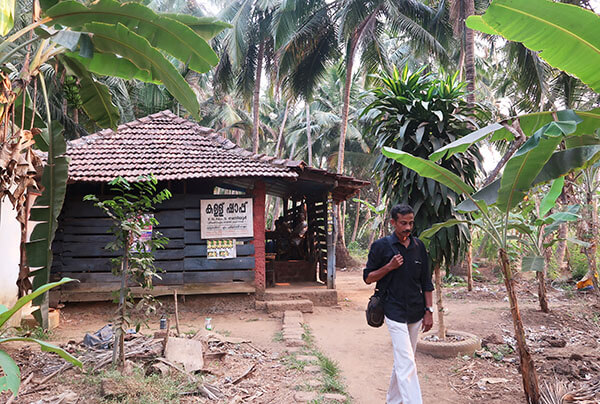
A family day
Sunday is a family day in many Indian households. Praveen had arranged for me to learn how to make Ari Kaddukka, a famous Malabari snack of stuffed mussels at the home of one of his neighbours.
He got up early and purchased a bag of mussels from the fish market. Malabari mussels come in all sizes, and many have a vivid green edge around their shells.

But first there was time to meet the Shenoy family who were absolutely lovely. Nivedita, Praveen’s wife and their two children, daughter Pragathi who is nine and son Prabath who is six. Praveen’s mother Jyothi quietly and happily bustled between kitchen and sitting room, attending to various needs, but mainly being hostessy. Her husband Bagirath, a gent of the old school variety was laid up in bed with a fractured hip. I was taken in to sit at his bedside for a chat. How much better to be an invalid at home with the family around, than in a hospital bed we agreed.
Next there was Praveen’s sister in law, another Jyothi, and her young son Praful aka Pinko, aged five. Her husband works abroad in Abu Dhabi.
Praveen’s mother showed me around the kitchen, and took me into a tiny room off to one side of it. She opened a pair of shutters and there was the well right there at the window. The water can be drawn up without having to go outside.
Praveen’s family originated in what is now Goa. They are Saraswat Brahmins, many of whom escaped when the Portuguese set about forcibly converting local communities to Christianity in the 16th century. The Shenoy ancestors settled in north Kerala as did many others, and are pretty much assimilated, but as well as speaking Malayalam, they have also kept alive their mother tongue of Konkani, and their love of the food of the Konkani region, the coastal area that runs from Goa down to Mangalore.

Next door but one, I was introduced to Raula and her husband, and daughter Razna, and welcomed into their spacious and comfortable home. Praveen has known them since his family moved to the area 20 odd years ago, when Razna was a little girl of six.
Raula and Razna had already started cleaning the mussels. Praveen stayed to help translate, although it was not necessary as Razna’s English was more than capable, but he enjoys teasing her, and they reminisced about how he would hang around their home when growing up to see what was cooking, especially intrigued by the non vegetarian dishes, as his home was vegetarian. Ramadan time would be especially exciting for the range of special snacks cooked for the fast breaking time.
Razna showed me how to open the mussel shells with a knife, something I am not accustomed to doing, as we always steam cook them in the shell.
There was some rice soaking in water, shallots, fresh grated coconut, some spices and green chillies to grind to make up the stuffing. A number of stages are involved in this recipe, and the stuffing is one that has to be done properly in order for the mussel to leave its shell and join the stuffing in the steamer. Mum and daughter worked quickly and deftly through this stage, making my attempts look clumsy.

There were more mussels than stuffing, so they prepared another dish with the balance, a simple but very tasty dish of mussels out of their shells, sauteed in coconut oil with mustard seeds, garlic, chilli powder, shallots and a tomato.
Razna’s two little girls arrived back from their Arabic studies, and entwined themselves around the chairs and door frames, briefly shy with shining eyes. Their grandfather joined us in the kitchen, and encouraged them to speak to me in English.
It turned out that it was the elder daughter’s eighth birthday and her mum told her that I was a special birthday visitor who had come all this way to wish her.
We sat down to taste and enjoy the fruits of our labours. A happy couple of hours passed in relaxed and enjoyable company, and we left them to get on and prepare their lunch.
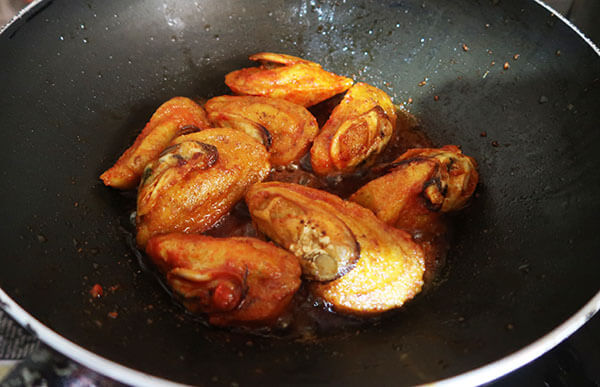
At the time of posting, Praveen and family are in lockdown in Kerala due to the Corona Virus pandemic. He has had to suspend his website and business activities for the time being until the situation changes. He hopes to restart when the situation improves.